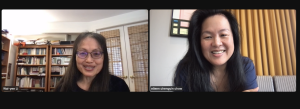Dear Friends,
We are inviting you to join in a public reading endeavor, in this spring of 2022.
Using the Twitter hashtag #ReadingTheStone, the account @ReadingTheStone, and a weekly (for now!) live chat with featured scholars and translators and experts in all manners of Red arcana – we hope to make the most of the public social commons as our collective reading space for reading and dreaming and discussing Dream of Red Chamber 紅樓夢, the 18th century fiction by Cao Xueqin 曹雪芹, the best known and also arguably, the best beloved work of literature in Chinese.
In my own teaching, in addition to weekly forum posts and response papers, my students often use social media as another commons for discussion – a space to be more playful, to engage with readers coming at the text from different backgrounds, languages, historical and cultural knowledge. No story is told alone – and it is always fascinating to witness the communities that coalesce around canonical texts.
#ReadingTheStone will be administratively supported by Duke’s Asian and Pacific Studies Institute (APSI) as well as Duke Story Lab. Down the road, we might wish to publish the book club proceedings in some form – though that would only be with the permissions of all of you involved.
Sharing a bit of an origin story for #ReadingTheStone; though if you are more auditorily inclined, you could also hear Wai-yee and me talk about it in our launch chat here. Over the years, Duke Story Lab has had many experiments with public-facing humanities events. One of the Lab’s chief missions has always been to breach the artificial boundary between the reading, writing, and storytelling that happens in the classroom, and that of the world outside. In spring of 2020, just as we shut down our physical lab space and were refashioning our regular Durham and Duke community events to virtual ones, I stumbled into a virtual book club on Twitter, reading War and Peace alongside strangers around the world. To be honest, it kept me afloat those early months.
Spearheaded by the writer Professor Yiyun Li of Princeton and the literary journal and publishing house A Public Space, #TolstoyTogether was a rather spontaneous gesture in the early days of the pandemic that grew into thousands of enthusiastic readers sharing their thoughts along the way, a great moment of community that was sustained over 3 months and that was eventually collected into a book that listed many of us as contributors.
Late last fall of 2021, two dear friends in rather separate realms of my life, both expressed instant enthusiasm for participating in a project on reading Dream of The Red Chamber together when I mentioned that I had tossed out this idea to Yiyun Li as to what I would like to read collectively if I were leading a public book club. What was inspiring was that my two friends were enthusiastic for entirely different reasons: Shen Lu, a brilliant journalist (and wordsmith and Hangzhou cuisine chef, among other talents!), confessed that though Hongloumeng felt like something that she should have already read but in fact never had; and Wai-yee Li, a world-reknowned expert in Ming-Qing dynasty literature who has researched and taught and written on Hongloumeng for decades, but who wondered if the fervent love and interest that so many of us have for the book in Chinese (or as scholars of Chinese literature in the academy), could be shared with a larger literary reading public, and that Hongloumeng could in fact be embraced as a work of world literature, much like the works of Tolstoy or Mann or Flaubert, without extensive scholarly apparatuses or hand-wringing over what might be lost in translation.
Gauntlet thrown.
I am a firm believer that we fall in love with books and characters and stories however we first come to them. Whether it be in the Red Inkstone edition with its copious and opinionated annotations, or the 1950s mini-comic books or many film, TV, and regional opera adaptations or via translations into multiple languages (abridged and unabridged) – we each have an origin story of how we fell into Dream of the Red Chamber.
And taking a story seriously – taking the time to read a story seriously – participating in a sustained conversation about a story with oneself and with others in community, seriously – can be a transformative and perhaps even life-changing experience. It has been for me.
Thank you for your interest and engagement with this project, especially given the fraught global historical moment and more urgent life-and-death matters all around us. But I do share in the conviction that, as Toni Morrison once so cogently put it, “This is the precisely the time when artists go to work. There is no time for despair, no place for self-pity, no need for silence, no room for fear. We speak, we write, we do language.”
If I didn’t truly believe that, I wouldn’t do what I do.
On behalf of the #ReadingTheStone community – welcome!
Eileen

[screenshot of Waiyee and Eileen on one of our twitter spaces live chats]